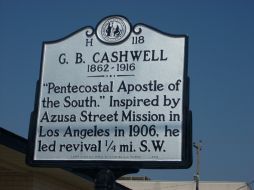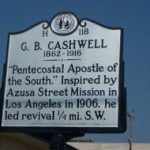
 Pentecostal Apostle to the South GB Cashwell and the Dunn, North Carolina Revival started on December 31, 1906
Pentecostal Apostle to the South GB Cashwell and the Dunn, North Carolina Revival started on December 31, 1906
Gaston Barnabas Cashwell known as “The Pentecostal Apostle to the South was born in 1860 and died from a heart-attack in 1916. But exactly 10 years before his passing in glory, his ministry influenced many denominations. About a dozen existing Pentecostal bodies can trace their Pentecostal heritage directly or at least in part to Gaston B. Cashwell.
In November 1906, GB Cashwell traveled to Los Angeles to visit the Pentecostal revival at the Azusa Street mission. In early December, he had an experience that he believed to be the baptism in the Holy Spirit and the evidence of speaking in tongues. They said he spoke in German.
Upon returning to Dunn, North Carolina, on December 31, 1906, Cashwell preached the Pentecostal experience in the local Holiness church. Interest in the Pentecostal experience was so great that he rented a local tobacco warehouse and began a month-long crusade. A revival broke out in North Carolina, especially in the holiness movement. Most of the ministers of the Pentecostal Holiness Church, the Fire-Baptized Holiness Church and the Holiness Free Will Baptist Churches were swept into Pentecostalism by this revival. Over the next six months, he toured the south preaching “Pentecost”. His zeal and influence in spreading Pentecostalism through the south has earned him the title of the Apostle of Pentecost to the South.
William Seymour announced in The Apostolic Faith that “Bro. G.B. Cashwell who came from North Carolina for his Pentecost, has returned on his way rejoicing to carry the good news of the Pentecost to the hungry souls there.” In December, 1906, Cashwell led a three-week revival meeting in an old tobacco warehouse in Dunn, NC, that introduced Pentecost to the entire region. Over the next two years, Cashwell was instrumental in leading hundreds into Pentecost, including M.M. Pinson, who later became one of the first executive presbyters of the Assemblies of God; A.J. Tomlinson, who founded the Church of God (Cleveland, TN), N.J. Holmes of Greenville, SC, founder of Holmes College of the Bible and J.H. King.
January of 1908 he preached in Cleveland, Tennessee, at the conclusion the General Conference of the Church of God. A.J. Tomlinson, at that time pastor of the church in Cleveland, received the Pentecostal baptism.
Pentecostal Holiness Church leaders such as G.B. Cashwell and G.F. Taylor encouraged potential missionaries to trust God to provide the necessary languages. Cashwell believed learning foreign languages in colleges would take too long and Jesus would come soon. Taylor ridiculed “scholarly clergymen and high-steeple officials” who wondered how to spread the gospel as being “19 centuries behind the times.” So, while Pentecostal churches and periodicals struggled to spread their message throughout the Southeast, they also solicited collections for foreign missions.
Shortly after Cashwell’s 1907 revival at Dunn, North Carolina, laypeople and leaders set out to places such as China, Japan, and India. Among those was PHC minister T.J. McIntosh.
McIntosh, who apparently was the first Pentecostal missionary to reach China, was the test case that revised a critical piece of this emerging formula. McIntosh was one of many who believed his xenolalic tongues were Chinese. Once in China he lamented in the Bridegroom’s Messenger, “Oh! How we would love to speak to these poor people. Of course, God speaks with our tongues, but not their language.” Reports that McIntosh and other missionaries were unable to communicate with people because God did not miraculously provide them with a foreign language caused considerable discomfort for Pentecostals. This news also elicited further criticism from their opponents.
The teaching on Spirit baptism was modified in Cashwell’s inaugural issue of The Bridegroom’s Messenger 1:1 (1 October 1907).Here he specifically contrasted xenolalia with languages learned at colleges for evangelizing the world. He called the “gift of tongues” (1 Corinthians 12) xenolalic in contrast with initial-evidence tongues orglossolalia. Cashwell argued that McIntosh and others who thought they had the gift of tongues were pure in their motives, but mistaken. Cashwell criticized the disunity these misunderstandings were causing, and called on Pentecostals to pray that missionaries would attain the necessary gift. As for himself, Cashwell realized that he had only obtained manifestations of tongues, but he continued to expect the gift of tongues just as much as he expected to see Jesus. In subsequent years, the phc greatly escalated its missionary outreach, but also made concessions by adopting stringent requirements for its missionaries, utilizing translators, and sponsoring a more traditional approach to acquiring foreign languages.
 In 1906 as G. B. Cashwell and Dunn NC opened a new era for the South. It was much like the recorded meeting that he had with people of all faiths and colors. The Methodist, Baptist, Presbyterians, Holiness Church and many others gathered to seek for the Baptism of the Holy Ghost and left that meeting as changed men and women for God. Our event was made up of an audience much like his was as we anticipated what God would do. The meeting started off with the guest speaker, Dr. Vinson Synan, author of many books on the holiness and Pentecostal movement in the United States, speaking on the historical significance of this site and the man behind the movement. Then the singers came and so did the wonderful power of God to visit with each of us as the Holy Ghost ministered to each one. As this marker was dedicated in the name of the Father, a white dove was released, in the name of the Son, another white dove was released and then in the name of the Holy Ghost, the third dove was released and they ascended high above and circled until the third dove joined the first two and then they headed home. You would have to be there to appreciate the beauty of this conclusion to the dedication ceremony.
In 1906 as G. B. Cashwell and Dunn NC opened a new era for the South. It was much like the recorded meeting that he had with people of all faiths and colors. The Methodist, Baptist, Presbyterians, Holiness Church and many others gathered to seek for the Baptism of the Holy Ghost and left that meeting as changed men and women for God. Our event was made up of an audience much like his was as we anticipated what God would do. The meeting started off with the guest speaker, Dr. Vinson Synan, author of many books on the holiness and Pentecostal movement in the United States, speaking on the historical significance of this site and the man behind the movement. Then the singers came and so did the wonderful power of God to visit with each of us as the Holy Ghost ministered to each one. As this marker was dedicated in the name of the Father, a white dove was released, in the name of the Son, another white dove was released and then in the name of the Holy Ghost, the third dove was released and they ascended high above and circled until the third dove joined the first two and then they headed home. You would have to be there to appreciate the beauty of this conclusion to the dedication ceremony.



Comments